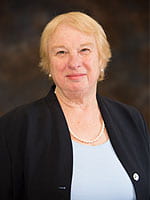
Professor Pulcini, a Professor of Nursing, was the Director of Community and Global Initiatives and served as the Chair of the Acute & Chronic Care Faculty Community. Maureen Albero, a Community Engaged Scholar at the Nashman Center, interviewed Professor Pulcini to learn more about her work.
Professor Pulcini has been with GW for seven and a half years and has been expanding international opportunities for Nursing students. Professor Pulcini’s dedication to local and global public health manifests in her research and initiatives. Locally, from the PCORI Grant, Professor Pulcini has been able “to research asthma barriers in children with special needs.” The PCORI Grant also allowed Professor Pulcini and her collaborators to focus her research in Washington, DC, Iowa, and Washington State. In DC, Professor Pulcini worked with “nurses and parents in schools to create a community engaged design study that focused on children with special needs and asthma.”
Professor Pulcini teaches and participates in a Community Health, a course at GW that is required for Nursing students. As a requirement in this course, students may go to either Haiti, Ecuador, Costa Rica, or Uganda for one week. In this one week, students are totally immersed in this community as they do 40-50 hours of service. Professor Pulcini asserts that “the goal in this course is for students to have a community health experience.” This one week abroad “satisfies a major portion of the clinical component of Community Health by providing healthcare, treatment, and education abroad.” Professor Pulcini noted that “Carol Lang, the current Director of Community and Global Initiatives, is working to expand the program to include Slovenia.”
Professor Pulcini noted that in recent trips to “Uganda and Haiti, students worked with community workers to teach community members about hypertension.” In Haiti, “students worked with mothers and children susceptible to anemia and parasitic diseases.” Professor Pulcini found this work in Haiti to be very intriguing as community members asked the facutly, and students, “to teach the community at large about anemia in hopes to implement preventative measures.” To maintain these global partnerships, new students in Community Health and experienced faculty members visit the same sites each year. To note, Community Health is offered every semester.
While students learn a tremendous amount about local and global public health from this experience, students also benefit in other less obvious ways. “After living in an under resourced part of the world,” Professor Pulcini has seen “students change the direction of their academic study, pursue higher degrees in public health, and work internationally.” When asked about her favorite student story, Professor Pulcini recounted a memorable student experience, “this student earned their doctorate in Global Health from Duke University and continued their post-doctorate fellowship at Harvard. Now, this student focuses their work on tuberculosis in South Africa.” From the student’s experience in Community Health, they were inspired to “center their career in International Health.”
Professor Pulcini encourages all students to take a service learning course because “you will learn so much about the community and world.”



